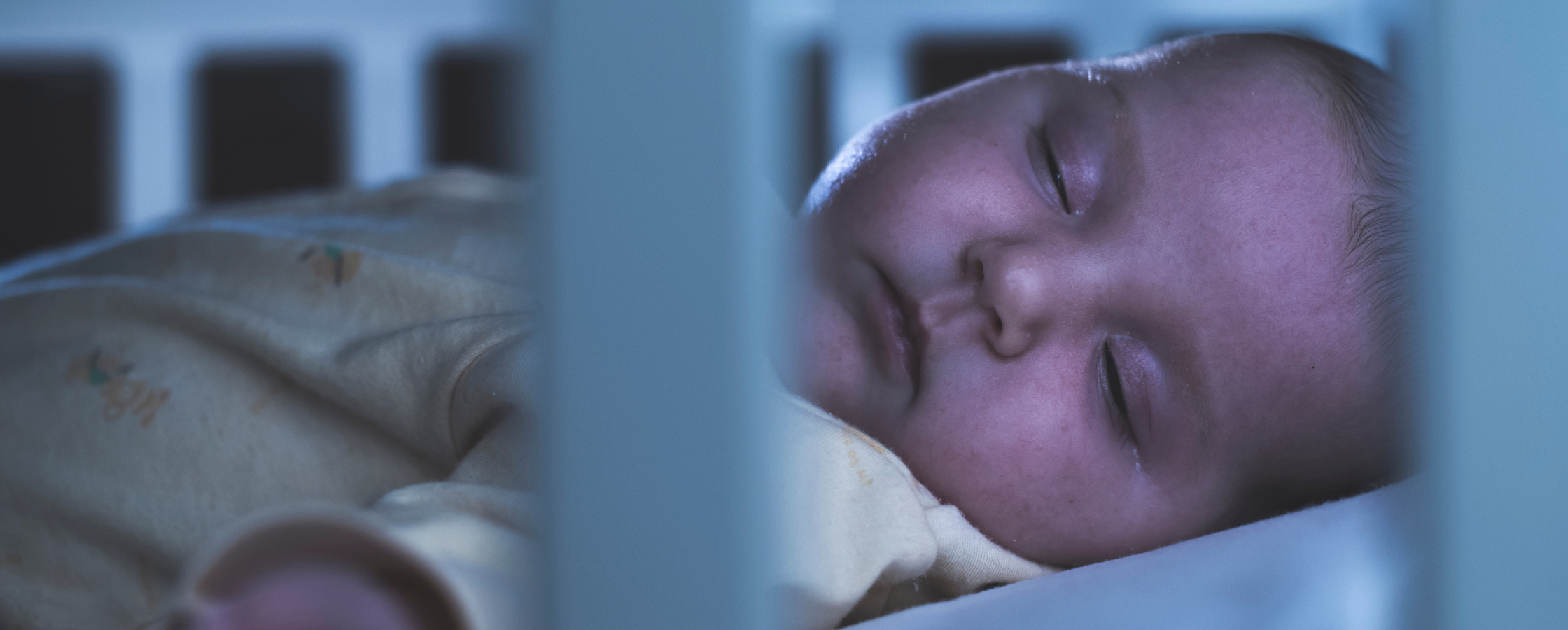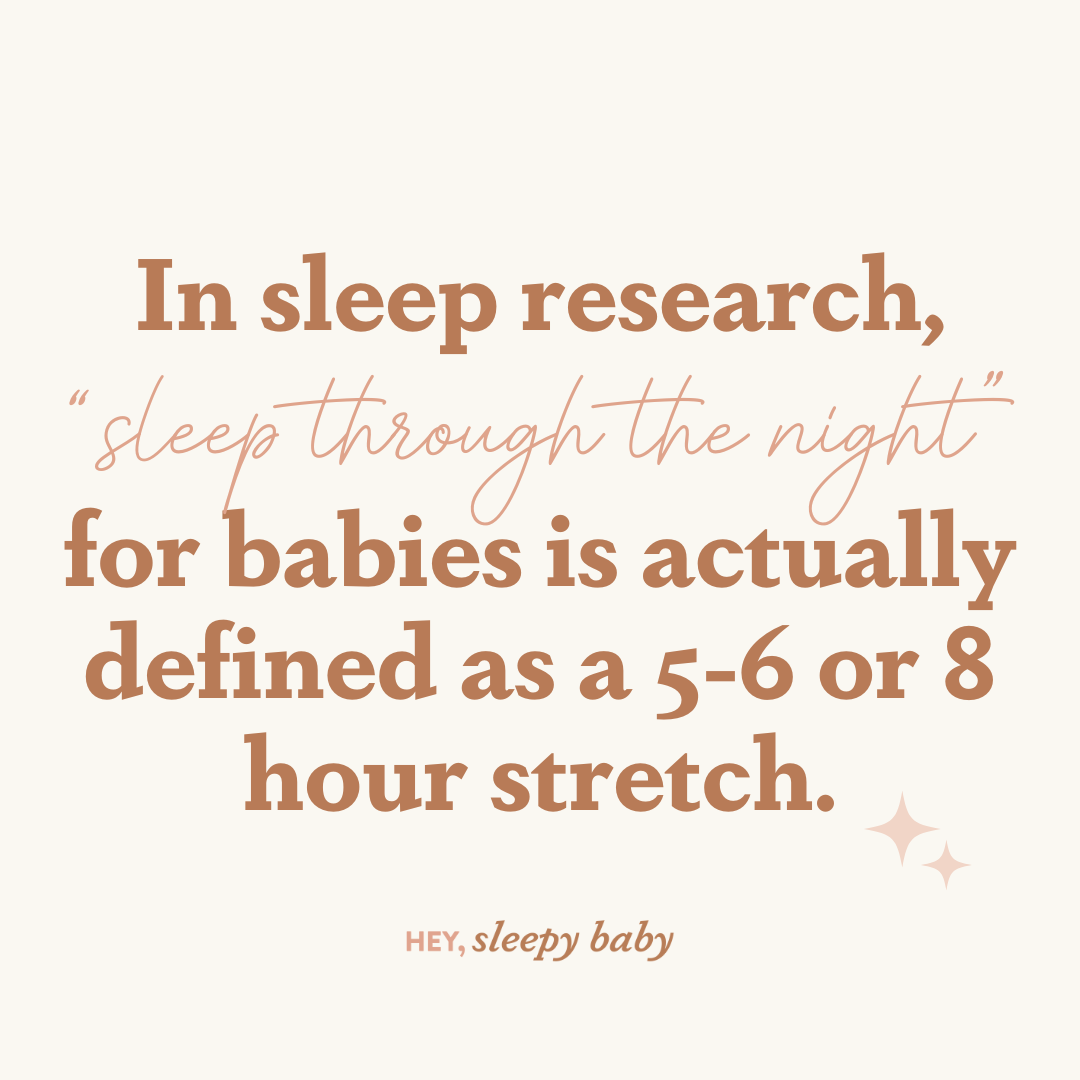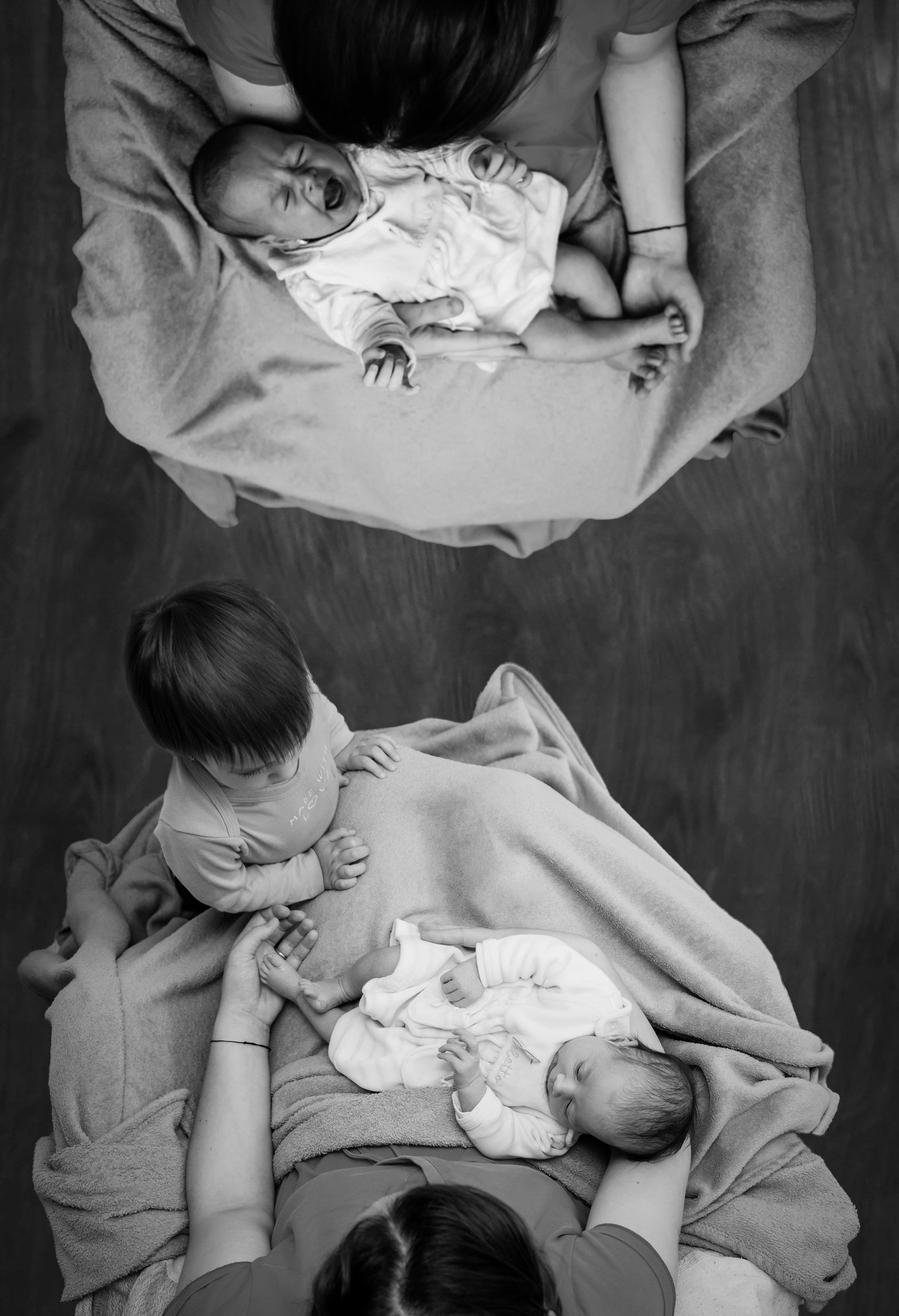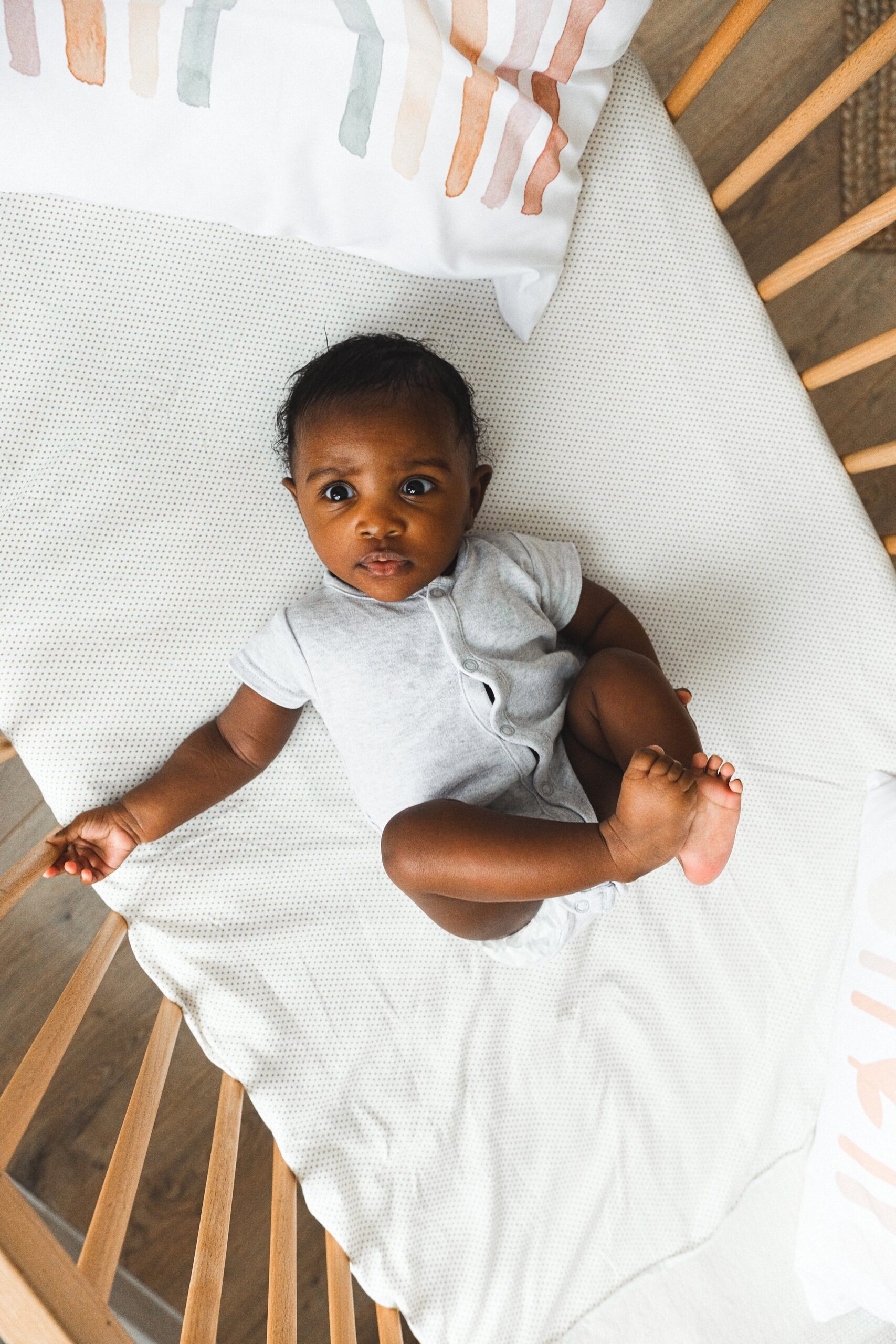I'm Rachael
Mom of 3 & Baby Sleep Expert with Big Sis Energy
& I’VE DONE ALL THE RESEARCH FOR YOU ALREADY.
Better sleep for the entire family
BROWSE COURSES
hey!
when do babies sleep through the night?
in this post:
-
should parents worry if their baby or toddler isn’t sleeping through the night?
-
what can parents try if their baby is not sleeping through the night?
It’s probably the most-googled question for all new parents. When will my baby start to sleep through the night? We all want to know when we’ll get a solid night of sleep again, it’s only natural! If only the answer were that simple…

What does it mean to sleep through the night?
First, we should define what “sleep through the night” or “STTN” actually means. None of us truly sleep through the night. We all awaken brieftly between sleep cycles (for adults rougly every 90 min, for babies about every 45-60 min). We may lightly rouse and jump right back into another sleep cycle, not even realizing we’ve been awake. Or we might roll over or adjust the blankets, or get up to go use the bathroom or grab a sip of water. Babies are just like us, except their sleep cycles are slightly shorter. When they wake between sleep cycles, they may fall right back to sleep OR they’ll cue for their caregivers. This might be because they’re hungry, thirsty, wet, cold, or just need some comfort. All of these reasons for waking up and calling out are valid- but when will they stop?

In sleep research, “sleep through the night” for babies is actually defined as a 5-6 or 8 hour stretch. That’s right. There’s no research on infant sleep that defines STTN as 12 hours per night. So you can forget about that magical 7-7 schedule you’ve heard about- it’s great if it happens but it’s not necessary for all babies! Some parents may feel that their baby DOES sleep through the night even though they are getting fed. If a baby sleeps through a couple of feedings per night and goes right back down, you can definitely consider this sleeping through the night. For other parents, those wakes are still disruptive to their own sleep, or it’s taking a while to get their baby back down each time. They would consider STTN as a more solid chunk of hours where their baby isn’t waking up and calling for them.
Whatever your definition, it’s important to know that like any other developmental milestone, babies are all on their own timetable. Some babies start to sleep through the night and wean night feedings on their own from just a couple of months old. Others are still waking up well into toddlerhood and parents have to take a more active weaning approach. There is a huge range for what is “normal” for when a child will sleep through the night. It’s also important to NOT look at STTN as some sort of “finish line.” Sleep is not linear. Even if your newborn sleeps through the night, it isn’t a guarentee it’ll stay that way. There are multiple periods in the first 1-2 years where sleep can really backslide- and it’s no one’s fault! It’s just the way it is. Baby sleep isn’t perfect and we shouldn’t be setting parents up to feel like it’s some sort of important achievement for their baby to finally sleep through the night.
It’s also key to remember the role that temperament plays in all aspects of life, including sleep. Children with more sensitive temperaments may take longer to sleep through independently. This is for a variety of reasons- a more highly reactive sensory system, higher need for things like touch, closeness, reassurance, etc., a lower stress threshold and so on.
I know you probably want some numbers now. We do have some pretty good data from rather large birth cohorts that show average sleep in the first 2 years of life. For the purpose of this blog post we’ll focus on the number of nightwakings, and age at which children generally stop waking up so much at night.
Paavonen, et al 2020 found that sleep quality is highly variable particularly during the first two years of life, but this variability decreased markedly towards the second year. First, sleep latency (the time it takes to fall asleep) decreased by the age of six months, while night-time sleep began to consolidate (meaning longer chunks of uninterrupted sleep) during the second year.
Paavonen et al measured sleep at ages 3, 6, 8, 12, 18 and 24 months in over 1,000 healthy children. They found that “night awakenings were common at all time points. The average number of night awakenings was 2.1-2.5 during the first year but it decreased to an average of 1.1 awakenings per night in 18 month olds and 0.9 in two year olds (Table 2). Moreover, in two year olds, 28.4% of the children still woke up every night or almost every night and 14.9% had at least two night awakenings for which they needed resettling. The ability to self-soothe was relatively uncommon in our samples throughout the follow-up; the highest rate was seen at the age of 18 months, when it reached 50.2%.”
They also found that the range for night wakings is huge- so it’s probably best not to compare your baby with your friend’s babies. For example, the range of night awakenings at eight months went from zero to 21.
In another study of 44 infants at 6 months old, parents on average reported that their infant slept 6 hours consecutively for about 5 nights out of 13. 20.5% of the infants never slept 6 hours consecutively, three (6.8%) met the criterion every night, but most infants (n = 32; 72.7%) showed high variability between the nights. Mothers reported that their infant slept 8 hours consecutively for about 3 nights out of 13. Half of the infants 50.0% never slept 8 hours consecutively, one infant (2.3%) slept 8 h consecutively every night, and twenty-one infants (47.7%) showed high variability. This study measured STTN as just 6 or 8 hours- hardly all night long!
when should babies stop feeding at night?
Let’s take a look at some more research on baby sleep and feeding to find out what’s normal and what you can expect for feeding at night.
-
One study took 715 mothers with babies 6-12 months old. They found that “78.6% still regularly woke at least once a night, with 61.4% receiving one or more milk feeds. Both night wakings and night feeds decreased with age. No difference in night wakings or night feeds was found between mothers who were currently breastfeeding or formula feeding. However, infants who received more milk or solid feeds during the day were less likely to feed at night but not less likely to wake.” (Brown & Harries 2015).
-
Another study looked at the total amount of breastfeeds per 24 hours for infants 1-6 months. It found that night breastfeedings were common and made an important contribution to the total milk intake. Infants breastfed 11 +/- 3 times in 24 hours (range: 6-18) (Kent et al 2016).
-
Another study which didn’t look at feeding in particular but at night wakings found that, using a definition of either 6 or 8 hours of uninterrupted sleep, 27.9% to 57.0% of 6- and 12-month-old infants did not sleep through the night. We can only assume that many of those infants were waking up and using a feeding to get back to sleep (Pennestri 2018), as this is often the quickest and easiest way to soothe babies at night.
To learn more about normal night feeds plus see what those in the HSB community said about their babies’ feeding habits at night, check out this post.
do babies just “grow out of” sleep problems?
Many people think that you must either “sleep train” or “wait it out” when it comes to baby sleep. However there’s a lot of options in between! First, it’s helpful to know how likely it is that your child actually has a “sleep problem” and if they will grow out of it or not simply with time.
What is a “sleep problem?”
Sleep problems can be tricky to tease out because they are sometimes self-reported. In infant sleep research, for example, it’s often parents who self-report a “sleep problem” in their infant. Some “sleep problems” that are asked to be reported on in such studies include sleep onset latency, sleep maintenance, 24-hour sleep duration, daytime sleep/naps, sleep location, restlessness/vocalization, nightmares/night terrors, and snoring.
Prevalence rates of infant sleep problems consistently range between 20-30% across studies in newborns, infants, and toddlers. One study found:
-
Night wakings and shorter sleep duration were associated with a parent-reported sleep problem during infancy and early toddlerhood (6–24 months)
-
Whereas nightmares and restless sleep emerged as associations with report of a sleep problem in later developmental periods (24–36 months).
-
21% percent of children with sleep problems in infancy (compared with 6% of those without) had sleep problems in the third year of life.
Do babies “grow out of” sleep problems?
There are some “sleep problems” that can be chalked up to age, development, etc. Some sleep problems can be “fixed” with things like improved sleep hygiene, addressing feeding issues, adjusting the routine or sleep environment, or figuring out the timing of naps, bedtime, etc. that works for the individual child. Some sleep problems arise because of the child’s temperament simply needing more support from their caregiver to fall asleep and stay asleep. So yes, some sleep problems do go away with time, and others are medical that will not likely go away over time without intervention. There are a few reasons infants may have long lasting sleep problems that go unaddressed. One important reason is that it is not being properly screened for. It’s important to bring up any concerns you have regarding your child’s sleep with your doctor and to seek another opinion if necessary. Take videos and notes if you are experiencing sleep issues with your child or other symptoms like restless sleep, rashes, screaming during sleep, pauses or gasps in breathing during sleep, etc.
Should parents worry if their baby or toddler isn’t sleeping through the night?
Usually the answer is no! Most babies will wake throughout infancy and it’s just the way babies work, not something going wrong. This same study found that there were no detectable impacts on a child’s physical or mental development if they were not able to sleep for these longer consecutive periods as an infant. We need to remember that night awakenings are normal for babies and they do not equate to sleep deprivation. Fragmented sleep is to be expected at least in the first year, and parents need not to worry if their baby doesn’t sleep through the night by age 1 or even 2.
However, if your little one has very disrupted sleep AND additional symptoms, you may want to have a conversation with their healthcare provider. There are some sleep “red flags” that can make it difficult for your baby to sleep well, such as airway issues, food intolerances, nutritional or mineral deficiencies or other medical conditions. These things are not likely to just resolve with time, and you don’t need to “wait it out.” Keep track of what you’re seeing, take photos and videos of symptoms like snoring or discomfort, and share with your doctor or see a specialist for a sleep study. Read more about the “sleep red flags” in this post.
If you’re struggling with your little one’s sleep or you’re just not sure what’s normal and what’s not, I recommend:
For NEW parents: The Newborn Masterclass is your one-stop shop for learning all about biological sleep and feeding and how to establish healthy sleep habits from the start.
For Toddler parents: If you’ve got a toddler who is still waking up and needing you at night or getting them to go to bed is getting very difficult, check out the Better Bedtimes Guide.
For Bed Sharing families: If you want to try moving your little one to their own room, check out the Tender Transitions course.
If you want to try Night Weaning: Night Weaning can, for some, lead to more consolidated sleep. Check out the Night Weaning Workshop for babies 12+ months.
Not sure which one is the right fit? Try our free sleep quiz to learn which resource will be the best one for you, or book a consultation with our team of experts so you can get a personalized plan plus the guidance and reassurance throughout the process.
What can parents try if their baby is not sleeping through the night?
To support your baby’s sleep it’s important to learn what we can optimize and what we need to let go of. Sleep is not within our control. We can set ourselves up for success, though! Here is a freebie guide jam-packed with some tips to get more sleep without sleep training. Click below to get the FREE download sent directly to your email.
Featured
Responsive sleep tips and support for parents of multiples or twins.
What are floor beds? When to use them? And How to use them?
Before you start changing anything it’s important that you have ruled out any underlying reasons why your infant might have such a strong link to staying latched.
Was this helpful? Save it for later!

Sources:
-
Paavonen EJ, Saarenpää-Heikkilä O, Morales-Munoz I, Virta M, Häkälä N, Pölkki P, Kylliäinen A, Karlsson H, Paunio T, Karlsson L. Normal sleep development in infants: findings from two large birth cohorts. Sleep Med. 2020 May;69:145-154. doi: 10.1016/j.sleep.2020.01.009. Epub 2020 Jan 20. PMID: 32087408.
-
Pennestri MH, Burdayron R, Kenny S, Béliveau MJ, Dubois-Comtois K. Sleeping through the night or through the nights? Sleep Med. 2020 Dec;76:98-103. doi: 10.1016/j.sleep.2020.10.005. Epub 2020 Oct 10. PMID: 33130350.
-
Marie-Hélène Pennestri, Christine Laganière, Andrée-Anne Bouvette-Turcot, Irina Pokhvisneva, Meir Steiner, Michael J. Meaney, Hélène Gaudreau, on behalf of the Mavan Research Team; Uninterrupted Infant Sleep, Development, and Maternal Mood. Pediatrics December 2018; 142 (6): e20174330. 10.1542/peds.2017-4330
binge reads
We think you'll love these
You deserve to the
baby stage, not just "survive it."
And you DON'T have to sacrifice your values, ignore your instincts, or force yourself to follow a method you don't align with just to get your baby back to sleep.
I’m here to help you create a restful, sustainable sleep environment that honors both your baby’s needs AND your own (without the stress OR the guilt!) because, no, you don’t have to choose between the two.
enjoy!
BABY SLEEP COURSES →
BABY SLEEP CONSULTS →
Wish you could help your baby sleep better without resorting to sleep training? Download my FREE guide to a good night’s sleep and learn 8 simple, science-backed tips for supporting your child’s needs.
Traditional sleep training methods don’t have to be your solution to better sleep.
SLEEP TRAINING ISN’T THE ONLY WAY TO GET GOOD SLEEP
Hey, I'm Rachael and Hey, Sleepy Baby is for parents who want to get their nights back, without sleep training their babies.
NO ONE TOLD US POD
explorING the untold truths of parenting






